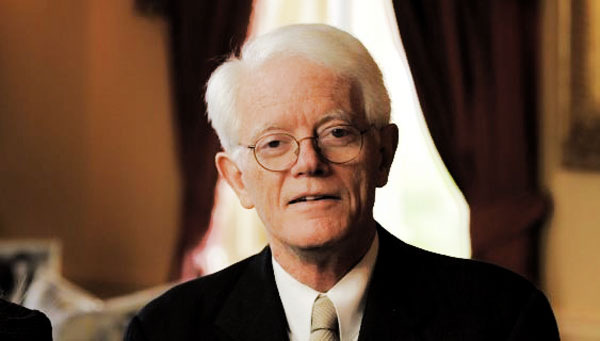by Cole Smead, Smead Capital Management
Late last year, there were three people that we observed as optimistic about the prospects of the oil business. These people were Warren Buffett, Sam Zell and Peter Lynch. In revisiting their comments before and after the shutdown of the economy, we can see that two of the three have significantly altered their opinion. Warren Buffett has shared his thoughts in his first ever virtual shareholder meeting sans Charlie Munger. Sam Zell shared his comments on Bloomberg with what he sees as the effects of what has taken place. Both of these gentlemen leave stock market participants with one feeling: There is virtually no hope for the economy and thus oil. Which leaves us thinking only one thing: What would Peter Lynch say?
Warren Buffett got involved in the oil business in a significant way with Berkshire Hathaway (BRK.B) investing $10 billion in May of 2019 in preferred shares with an 8% coupon and warrants at $62.50. In his interviews that followed the conglomerate’s investment, Buffett stated that the investment was a price bet on oil. He said, “If oil goes up, you make a lot of money.” He went on to say in the interview:
“It’s also a bet on the fact that the Permian Basin is what it is cracked up to be,” the chairman and CEO of Berkshire told CNBC’s Becky Quick. But “oil prices will determine whether almost any oil stock is a good investment over time.”
After the shutdown of the economy and oil trading at negative prices for a day, Buffett brought a wet blanket to this whole discussion. He started the 2020 Berkshire Hathaway shareholder meeting by making the case that investors should never bet against America. He then told shareholders like us why he’d rather not bet at all right now.
“We have not done anything because we haven’t seen anything that attractive,” Buffett said. “We are not doing anything big, obviously. We are willing to do something very big. I mean you could come to me on Monday morning with something that involved $30, or $40 billion or $50 billion. And if we really like what we are seeing, we would do it.”
If you are reading for sins of omission, Buffett is saying that they’d love to make a big purchase. However, they don’t view anything in the open market attractive or anything they already own to be attractive. This sounds odd for a person that says don’t bet against America. It’s even more odd for someone that thought so highly of the Permian Basin. Have the next 25 years of life changed so greatly to completely change your tune? If we are not to bet against America, are we to be indifferent and not have any bets on the prosperous future? Occidental is paying Berkshire Hathaway $800 million per year in dividends, either cash or stock. It would be untrue to say it isn’t top of mind for him and Charlie.
The grave dancer, Sam Zell, was taking an optimistic approach last year in the oil business in his fashion and style. He was acquiring distressed assets in the oil patch. One hundred dollars per barrel of oil looked far away for investors even though it was last there in 2014 — less than six years ago. He said on Bloomberg TV:
“The amount of capital available in the oil patch is disappearing,” Zell said Thursday. “I compared it to the real estate industry in the early 1990s, where you had empty buildings all over the place, nobody had cash.”
If you look back to the real estate business in the early 1990’s, you’ll find that the problems were all sown in the late 1980’s Savings and Loan Crisis (SNL). Savings and loans began taking more than bread and butter risks against their deposits as there had been a large pick up in development in the first half of the 1980’s. This all climaxed with the building of anything from hotels (The Phoenician Hotel in Scottsdale) and commercial buildings being fairly empty in the first part of the 1990’s. My hometown of Seattle boomed in commercial construction at the time, only to find too few tenants to fill those buildings, as Zell mentioned. Zell made a name for himself because he didn’t participate in the downfall, but rather by being a shrewd investor in the aftermath and the carnage.
This last week Zell was interviewed by Bloomberg and started the television spot early on by stating, “We’re all going to be permanently scarred by having lived through this.” He then later stated:
“Bankruptcies are what you need to clear markets and what you need to end recessions and dips,” Zell said. “The fact that there’s a lot more distressed players today will help clear the market, but it also means that there aren’t anywhere near as many opportunities as there were in the past.”
The oddity of these statements is that Zell is forgetting the 1980’s SNL crisis. The banking and real estate sectors of the economy were permanently scarred by that crisis. Contrary to what he stated about the opportunities, there are a myriad of opportunities today, relative to six months ago. Zell’s lack of optimism came through in his other comments where he explained that this was going to be like the Great Depression to a prior generation and that no one was going back to doing normal things in airlines, hotels and other economic activities. No optimism on the economy, thus no optimism for economically sensitive arenas like oil.
Peter Lynch in Barron’s magazine in December of 2019 was interviewed and opined on what he saw in the oil patch. Lynch stated:
I’m looking at industries that are doing badly; that for some reason will get better…Energy services is awful; that could have a major turn in the next year or two. Oil is interesting. Look, longer term, solar, windmills really work. But you need natural gas and oil to bridge to this. Everybody’s assuming the world’s going to not use oil for the next 20 years, or next year. China might sell five million electric vehicles next year, but they might also sell 17 million internal combustion engines. They don’t have old cars to retire. There are no electric airplanes. Near term, liquid natural gas and liquid petroleum gas might replace diesel fuel for trucks. I’m buying companies that I don’t think will go bankrupt. They’ve got to be around the next 18 to 24 months, or I have no interest.
Barron’s reiterated Lynch’s view on the future:
His optimism—the hallmark of a growth investor—is reassuring and infectious. He reiterates his mantra: Buy stocks, regardless of whether things look rosy or bleak. “The thesis underlying everything, whether you’re an actively managed fund or a passive fund, is that the U.S. will be OK. If you don’t believe that, you shouldn’t be in the stock market,” Lynch says.
To our knowledge, Mr. Lynch has not been interviewed since the shutdown of the economy. We don’t get to know his thoughts about the state of affairs today. We believe we have a strong hunch.
Many stock market participants are making the case that today’s circumstances are worse than the deep recession of 2008-2009. While we disagree with this assertion, due to items like bank capitalization, householder debt service ratios and personal savings rate, we revisited Lynch’s comments even then.
His interview article in The New York Times on March 7, 2009 reported:
“I’m always bullish,” Mr. Lynch said. A hard-core Boston Red Sox fan, he said his heart would have broken years ago if he’d ever allowed himself to turn negative: “Three months ago, 12 months ago, 10 years ago, 25 years ago, I’d have said the same thing.”
These three investors were all optimistic on the oil business last fall. Two of the three now believe the world has changed and carry a fearful eye towards the economy and the opportunities it affords. Charlie Munger had been quoted to say:
“This is the third time that Warren and I have seen our holdings of Berkshire go down, top tick to bottom tick, by 50%. I think it’s in the nature of long-term shareholding, of the normal vicissitudes in worldly outcomes and markets that the long-term holder has his quoted value of his stock go down by say 50%. In fact you could argue that if you are not willing to react with equanimity to a market price decline of 50% 2-3 times a century, you are not fit to be a common shareholder and you deserve the mediocre result that you are going to get, compared to the people who do have the temperament who can be more philosophical about these market fluctuations.”
Munger’s words are stark in today’s context. How many people want to sit through the 50% decline in an industry they believe has bright prospects (“the Permian Basin is what it’s cracked up to be”)? Very few, including the smart people. Who remembers that the best prices are afforded during the worst outlooks like Mr. Zell saw in the early 1990’s real estate business? Very few, including the smart people. Mr. Lynch sits in a class of his own currently, out of the fray. While we will look forward to hearing his comments when he goes on the record, we anticipate that he’ll see a myriad of opportunities in stocks, particularly the oil business with a bullish stance on the future. Until then, search for Peter Lynch and keep from a broken heart.
Warm regards,

Cole Smead, CFA
The information contained in this missive represents Smead Capital Management’s opinions, and should not be construed as personalized or individualized investment advice and are subject to change. Past performance is no guarantee of future results. Cole Smead, CFA, President and Portfolio Manager, wrote this article. It should not be assumed that investing in any securities mentioned above will or will not be profitable. Portfolio composition is subject to change at any time and references to specific securities, industries and sectors in this letter are not recommendations to purchase or sell any particular security. Current and future portfolio holdings are subject to risk. In preparing this document, SCM has relied upon and assumed, without independent verification, the accuracy and completeness of all information available from public sources. A list of all recommendations made by Smead Capital Management within the past twelve-month period is available upon request.
©2020 Smead Capital Management, Inc. All rights reserved.
This Missive and others are available at www.smeadcap.com.














